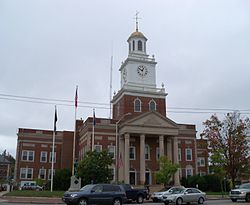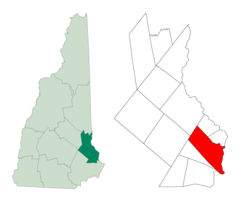Dover, NH
| Dover, New Hampshire | ||
|---|---|---|
| City | ||

City Hall
|
||
|
||
| Nickname(s): The Garrison City | ||
 Location within New Hampshire |
||
| Coordinates: 43°11′41″N 70°52′30″W / 43.19472°N 70.87500°WCoordinates: 43°11′41″N 70°52′30″W / 43.19472°N 70.87500°W | ||
| Country | United States | |
| State | New Hampshire | |
| County | Strafford | |
| Settled | 1623 | |
| Incorporated | 1623 (town) | |
| Incorporated | 1855 (city) | |
| Government | ||
| • Mayor | Karen Weston | |
| • City Council | Robert Carrier Sarah Greenshields John O'Connor Dennis Ciotti Deborah Thibodeaux Joseph Nicolella Dennis Shanahan Jason Gagnon |
|
| • City Manager | Michael Joyal | |
| Area | ||
| • Total | 29.0 sq mi (75.2 km2) | |
| • Land | 26.7 sq mi (69.2 km2) | |
| • Water | 2.3 sq mi (6.0 km2) 7.96% | |
| Elevation | 50 ft (15 m) | |
| Population (2010) | ||
| • Total | 29,987 | |
| • Estimate (2016) | 31,153 | |
| • Density | 1,166/sq mi (450.2/km2) | |
| Time zone | EST (UTC-5) | |
| • Summer (DST) | EDT (UTC-4) | |
| ZIP codes | 03820-03822 | |
| Area code(s) | 603 | |
| FIPS code | 33-18820 | |
| GNIS feature ID | 0866618 | |
| Website | www |
|
Dover is a city in Strafford County, New Hampshire, in the United States of America. The population was 29,987 at the 2010 census, the largest in the New Hampshire Seacoast region. The population was estimated at 31,153 in 2016. It is the county seat of Strafford County, and home to Wentworth-Douglass Hospital, the Woodman Institute Museum, and the Children's Museum of New Hampshire.
The first known European to explore the region was Martin Pring from Bristol, England, in 1603. In 1623, William and Edward Hilton settled Cochecho Plantation, adopting its Abenaki name, making Dover the oldest permanent settlement in New Hampshire, and seventh in the United States. One of the colony's four original townships, it then included Durham, Madbury, Newington, Lee, Somersworth and Rollinsford.
The Hiltons' name survives at Hilton Park on Dover Point (which was originally known as Hilton Point), where the brothers settled near the confluence of the Bellamy and Piscataqua rivers. They were fishmongers sent from London by The Company of Laconia to establish a colony and fishery on the Piscataqua. In 1631, however, it contained only three houses. William Hilton built a salt works on the property (salt-making was the principal industry in his hometown of Northwich, England). He also served as Deputy to the General Court (the colonial legislature).
...
Wikipedia

